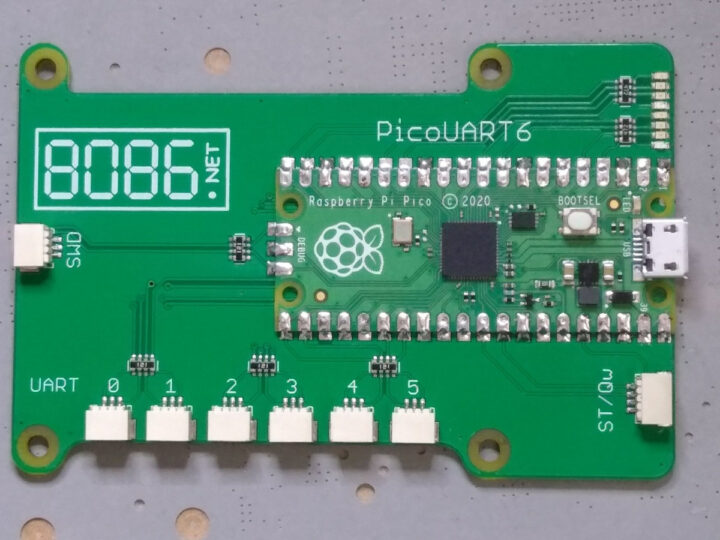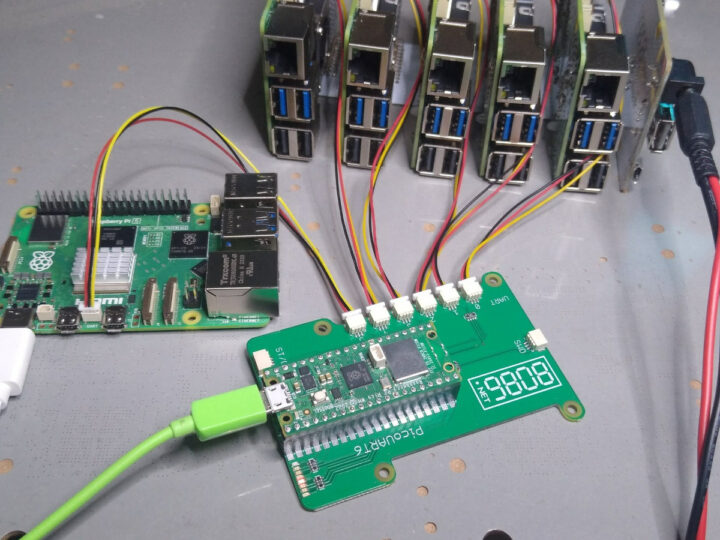PicoUART6 is a small USB to UART bridge board that takes a Raspberry Pi Pico board and exposes six UART ports to connect up to six Raspberry Pi 5 SBC’s over the new 3-pin UART connector.
The Raspberry Pi 5 has created a lot of buzz since its announcement in September 2023, and people most talked about its higher performance compared to a Raspberry Pi 4 and its new (non-standard) FCP PCIe connector, but the new Raspberry Pi SBC also features a 3-pin JST UART connector that was not used in earlier and frees 3-pin on the 40-pin GPIO header. The PicoUART6 board makes use of this new connector to interface multiple Raspberry Pi 5 over UART and control them through the USB board of the Pico board.
PicoUART6 specifications:
- Footprint for Raspberry Pi Pico board
- Serial – 6x 3-pin JST UART connectors
- Expansion – STEMMA QT/Qwiic I2C connector
- Debugging – SWD connector to debug firmware on the Pico
- Misc – 6x LEDs for UART activity monitoring
- Dimensions – Compatible with Raspberry Pi HAT form factor to be mounted on top of a Raspberry Pi Model B SBC.

8086 Consultancy provides the pico-sexa-uart-bridge UF2 firmware that needs to be copied to the Raspberry Pi Pico and whose source code and binary file can be found on GitHub. Once this is done, six connect the board to your computer with a micro USB to USB cable, and six COM ports should show up on your computer. From there you can open terminal windows with Putty or another similar utility to monitor and control all Raspberry Pi 5 boards, or other boards with the same 3-pin JST connector…
The PicoUART6 sells for $7.62 on Tindie, but that’s without a Raspberry Pi Pico that needs to be soldered on the board. You’ll also need a few 3-pin 1mm pitch JST SH cables for the board to be useful, although purchasing those on Aliexpress or eBay will likely save you a few dollars.

Jean-Luc started CNX Software in 2010 as a part-time endeavor, before quitting his job as a software engineering manager, and starting to write daily news, and reviews full time later in 2011.
Support CNX Software! Donate via cryptocurrencies, become a Patron on Patreon, or purchase goods on Amazon or Aliexpress






wow – 6 rpi5s to play with…
I do wonder how they got so many to play with…
Interesting, I didn’t know there were so many UARTs on the Pico. That does indeed open a wide spectrum of possibilities to control all boards at once!
There actually isn’t, there are only two hardware UARTs. The extra ones come from the PIO.
OK so they’re only bit-banged ? Then I doubt it can deal correctly with multiple Rx at once (e.g. multiple machines booting after a power outage).
The PIO (Programmable I/O) blocks on the Raspberry Pi RP2040 MCU are quite capable. It’s different than using GPIOs for bit-banging.
OK thanks Jean-Luc for the explanation, I didn’t realize it was possible to offload some processing, and yeah then that makes sense.
They are probably using PIO since the rp2040 doesn’t have that many parts.
Micro USB should die as soon as possible. I’m happy to pay a bit more for USB-C on any device. Even cheap kids toys comes with USB-C connectors these days.
Hopefully all new upcoming models of Raspberry Pi will be updated also.
You may want to use a Raspberry Pi Pico “clone” with a USB-C port. The Banana Pi BPI-Pico is one, but there are others too.
I bought 2 of those when this article posted as I’ve had a need for a while.. I’ve only tested 1 UART port so far because making the cables isn’t fun… but It definitely works.. and also seems to “work” on the crazy rockchip 1500000 UART speeds. If I ever stress test all 6 i’ll share again. Git repo comes a file to drop into your udev/rules.d folder which is what exposes the i2c connection over USB. Amusingly I did a zmodem transfer of a 100M file with and got 143228 BPS vs 105369 BPS with a cheap CH341 uart.… Read more »